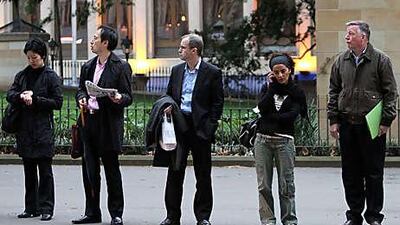SYDNEY // In a business world that requires increasingly productive workers, more and more employees are struggling to achieve a sensible balance between the demands of their jobs and their families. In Australia, employees are working longer hours and it is taking a heavy toll on their health and family life, according to a new university survey.
The fourth annual Australian Work and Life Index revealed that workers are growing more dissatisfied with time they devote to work. More than one-fifth of Australians are spending 48 hours or more on the job each week, and 60 per cent are not taking regular holidays. "The notion of an easy-going nation where we get plenty of time for relaxation is true for some, but for a growing proportion, especially men, that is not the case," said Professor Barbara Pocock, director of the Centre for Work and Life at the University of South Australia.
"I don't think people are working long hours in Australia in pursuit of the money," said Ms Pocock, who led the research. "They are doing it because of the culture in many workplaces, where you have to be there and be working hard. This is an interesting shift in Australia remembering that we led the world on reductions in the working week in the 1850s." At Sydney's Central Railway Station, commuters trudge along crowded platforms at the start of another grey, wintry day. The weather is matched by the glum expressions on many faces.
Alan Harvey, 38, a finance assistant, has travelled from the Central Coast region north of Sydney, a two-hour trip that he has done for the past decade and one he expects to make for the rest of his career. "You've got to mentally steel yourself [for the journey] because it is probably going to happen for the next 25 years, but I'm not alone," he said. "Everything is completely out of whack. I need to be in bed by 9.30pm and I'm up at 5am to be in at work on time. I get to see the family for about an hour each day. It wears you down after a while," Mr Harvey said.
The Work and Life Index has found that Australians have become increasingly unhappy in recent years about the effect work has had on them, especially women and fulltime male employees between 25 and 35 years old. While the Australian economy is in good shape and unemployment is low, job insecurity continues to stalk many workers. "Once you get a good job, you don't want to let it go and, yeah, you just do the work instead of having to line up again in the job queue," said Pete Crawford, 28, a designer in Sydney, who complained about the long hours he felt compelled to put in almost every day. "Me and my colleagues start early and last night we finished at 10 o'clock. That is pretty much a standard day. It is hectic and by the end of the week I'm stuffed. I'm exhausted now."
Research has shown that workers who clock long hours are less productive, are more likely to call in sick and visit their doctor more frequently. "Persistent long hours are associated with cardiovascular illness and higher rates of depression," said Ms Pocock, who said that children were also affected when their parents are tired and irritable. As the cost of living increases, many Australians have had to work more to keep up with household bills.
"Debt, particularly mortgage debt, has become a much larger part of household expenses, so more and more we are seeing the need for both partners to work to meet those financial responsibilities," said Ged Kearney, the president of the Australian Council of Trade Unions. "It is putting a lot more pressure on those families." Ms Kearney believes that worries about work were scarring society. She said she has called for concerted efforts from government, industry and the union movement to create more flexible workplaces as well as better childcare facilities.
"For both men and women we need to have big cultural changes about the importance of work, balancing it with our family responsibilities. It is important to have a life outside of work," she said. Back at Central Station, Brianna Sherrington, 23, a beautician, is sipping coffee after travelling from her home west of Sydney. "A lot of people stress out about commuting. There are a lot of defeated people on the train each morning and family life can disintegrate," she said. "You need money but you also need to be there for your loved ones."
foreign.desk@thenational.ae

